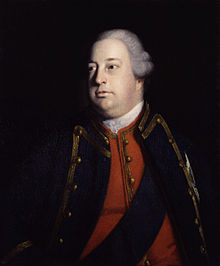
Back ويليام أغسطس دوق كمبرلاند Arabic Guillem August de Cumberland Catalan Vilém August Hannoverský Czech Vilhelm af Storbritannien (1721-1765) Danish William Augustus, Duke of Cumberland German Γουλιέλμος του Κάμπερλαντ Greek Guillermo Augusto de Cumberland Spanish شاهزاده ویلیام آگوستوس، دوک کامبرلند Persian Wilhelm Cumberland Finnish William Augustus de Cumberland French
| Prince William | |||||
|---|---|---|---|---|---|
| Duke of Cumberland (more) | |||||
 The Duke of Cumberland by Sir Joshua Reynolds, c. 1759 | |||||
| Born | 15 April 1721 (New Style) Leicester House, London, England | ||||
| Died | 31 October 1765 (aged 44) Mayfair, London, England | ||||
| Burial | 10 November 1765 Westminster Abbey, London | ||||
| |||||
| House | Hanover | ||||
| Father | George II of Great Britain | ||||
| Mother | Caroline of Ansbach | ||||
| Signature | |||||
| Military career | |||||
| Nickname(s) | The Butcher Sweet William Martial boy | ||||
| Allegiance | |||||
| Service | |||||
| Years of service | 1740–1757 | ||||
| Rank | General | ||||
| Unit | Grenadier Guards | ||||
| Commands | Pragmatic Army Government Army Hanoverian Army of Observation Commander-in-Chief of the Forces | ||||
| Battles / wars | |||||
Prince William Augustus, Duke of Cumberland (15 April 1721 [N.S.] – 31 October 1765) was the third and youngest son of King George II of Great Britain and Ireland and his wife, Caroline of Ansbach. He was Duke of Cumberland from 1726. He is best remembered for his role in putting down the Jacobite Rising at the Battle of Culloden in 1746, which made him popular in certain parts of Britain.[1][2] He is often referred to by the nickname given to him by his Tory opponents: 'Butcher' Cumberland.[3][4]
For much of the War of the Austrian Succession, with the assistance of John Ligonier, Cumberland commanded the main allied field army in Flanders acting in defence of the Austrian Netherlands and the Dutch Republic. At the head of the largest deployment of British troops on the continent since the days of Marlborough and opposed to the experienced French Marshal Maurice de Saxe, Cumberland's campaigning could not prevent the fall of the Dutch Barrier Forts. Between 1748 and 1755 he attempted to enact a series of army reforms that were resisted by the opposition and by the army itself.[5] Following the Convention of Klosterzeven in 1757, he never again held active military command and switched his attentions to politics and horse racing.
- ^ For example, he received an honorary doctorate from the University of Glasgow. "On This Day: 27th of June". University of Glasgow. Retrieved 17 February 2014.
- ^ Hannah Smith, 'Georgian Monarchy', Cambridge University Press, 2006
- ^ Cite error: The named reference
odnbwas invoked but never defined (see the help page). - ^ MacDonald, Callum (27 December 2005) "Butcher Cumberland among Britain's greatest villains". Glasgow. The Herald. Retrieved 12 October 2013.
- ^ Davies, p. 277; Glover, p. 148; Royle, p. 25